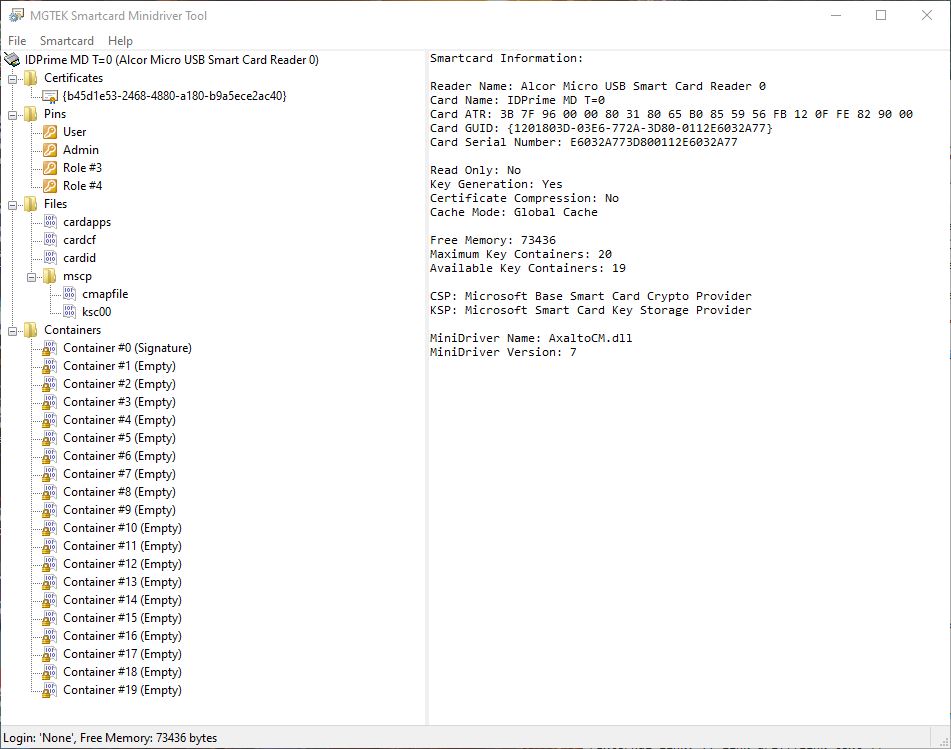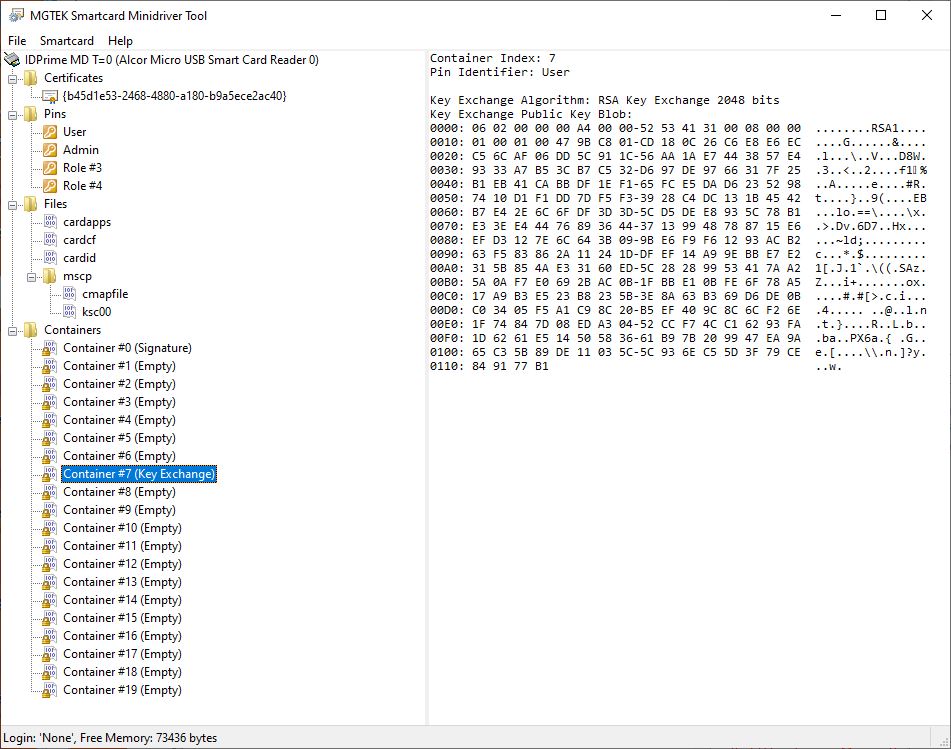|
|
(Unicode C) ScMinidriver - Import Private Key to Smart Card
Demonstrates how to import a private key to the "signature" or "key exchange" location in the Nth key container on a smart card.
#include <C_CkPrivateKeyW.h>
#include <C_CkScMinidriverW.h>
void ChilkatSample(void)
{
HCkPrivateKeyW privKey;
BOOL success;
HCkScMinidriverW scmd;
const wchar_t *readerName;
const wchar_t *pinId;
int retval;
// This example requires the Chilkat API to have been previously unlocked.
// See Global Unlock Sample for sample code.
// Chilkat recommends the following free tool for interactively examining the contents of your smart card
// through the ScMinidriver interface: MGTEK Tool for Minidriver enabled Smart Cards
// Let's first look at our smart card before importing a private key.
// Here's the view of our Gemalto (Thales) IDPrime MD T=0 smart card in the MGTEK tool:
 // First let's load a private key into the Chilkat private key object.
// (Chilkat provides the ability to load private keys from many different sources and formats.
// this example loads from a PEM file.)
privKey = CkPrivateKeyW_Create();
success = CkPrivateKeyW_LoadPemFile(privKey,L"qa_data/rsa/rsaPrivKey_pkcs8.pem");
if (success == FALSE) {
wprintf(L"%s\n",CkPrivateKeyW_lastErrorText(privKey));
CkPrivateKeyW_Dispose(privKey);
return;
}
scmd = CkScMinidriverW_Create();
// First we need to acquire a context to the smart card in the reader where it is inserted.
// Reader names (smart card readers or USB tokens) can be discovered
// via List Readers or Find Smart Cards
readerName = L"Alcor Micro USB Smart Card Reader 0";
success = CkScMinidriverW_AcquireContext(scmd,readerName);
if (success == FALSE) {
wprintf(L"%s\n",CkScMinidriverW_lastErrorText(scmd));
CkPrivateKeyW_Dispose(privKey);
CkScMinidriverW_Dispose(scmd);
return;
}
// If successful, the name of the currently inserted smart card is available:
wprintf(L"Card name: %s\n",CkScMinidriverW_cardName(scmd));
// To import a private key, we'll need to be PIN authenticated.
// For more details about smart card PIN authentication, see the Smart Card PIN Authentication Example
pinId = L"user";
retval = CkScMinidriverW_PinAuthenticate(scmd,pinId,L"0000");
if (retval != 0) {
wprintf(L"PIN Authentication failed.\n");
CkScMinidriverW_DeleteContext(scmd);
CkPrivateKeyW_Dispose(privKey);
CkScMinidriverW_Dispose(scmd);
return;
}
// Let's import into the "key exchange" position in key container #7.
success = CkScMinidriverW_ImportKey(scmd,7,L"kex",privKey,L"user");
if (success == FALSE) {
wprintf(L"PIN Authentication failed.\n");
CkScMinidriverW_DeleteContext(scmd);
CkPrivateKeyW_Dispose(privKey);
CkScMinidriverW_Dispose(scmd);
return;
}
CkScMinidriverW_DeleteContext(scmd);
wprintf(L"Success.\n");
// Here's the MGTEK view of the smart card after importing the private key:
// First let's load a private key into the Chilkat private key object.
// (Chilkat provides the ability to load private keys from many different sources and formats.
// this example loads from a PEM file.)
privKey = CkPrivateKeyW_Create();
success = CkPrivateKeyW_LoadPemFile(privKey,L"qa_data/rsa/rsaPrivKey_pkcs8.pem");
if (success == FALSE) {
wprintf(L"%s\n",CkPrivateKeyW_lastErrorText(privKey));
CkPrivateKeyW_Dispose(privKey);
return;
}
scmd = CkScMinidriverW_Create();
// First we need to acquire a context to the smart card in the reader where it is inserted.
// Reader names (smart card readers or USB tokens) can be discovered
// via List Readers or Find Smart Cards
readerName = L"Alcor Micro USB Smart Card Reader 0";
success = CkScMinidriverW_AcquireContext(scmd,readerName);
if (success == FALSE) {
wprintf(L"%s\n",CkScMinidriverW_lastErrorText(scmd));
CkPrivateKeyW_Dispose(privKey);
CkScMinidriverW_Dispose(scmd);
return;
}
// If successful, the name of the currently inserted smart card is available:
wprintf(L"Card name: %s\n",CkScMinidriverW_cardName(scmd));
// To import a private key, we'll need to be PIN authenticated.
// For more details about smart card PIN authentication, see the Smart Card PIN Authentication Example
pinId = L"user";
retval = CkScMinidriverW_PinAuthenticate(scmd,pinId,L"0000");
if (retval != 0) {
wprintf(L"PIN Authentication failed.\n");
CkScMinidriverW_DeleteContext(scmd);
CkPrivateKeyW_Dispose(privKey);
CkScMinidriverW_Dispose(scmd);
return;
}
// Let's import into the "key exchange" position in key container #7.
success = CkScMinidriverW_ImportKey(scmd,7,L"kex",privKey,L"user");
if (success == FALSE) {
wprintf(L"PIN Authentication failed.\n");
CkScMinidriverW_DeleteContext(scmd);
CkPrivateKeyW_Dispose(privKey);
CkScMinidriverW_Dispose(scmd);
return;
}
CkScMinidriverW_DeleteContext(scmd);
wprintf(L"Success.\n");
// Here's the MGTEK view of the smart card after importing the private key:
 CkPrivateKeyW_Dispose(privKey);
CkScMinidriverW_Dispose(scmd);
}
CkPrivateKeyW_Dispose(privKey);
CkScMinidriverW_Dispose(scmd);
}
|

